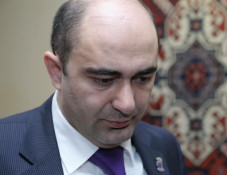
Scientists say having longer periods without food could be good for us
It is often said you are what you eat – but when you eat it may be just as important.
Researchers claim we are not designed for three meals a day – and having longer periods of little or no food could be good for us, the Daily Mail reports.
They say intermittent diets, such as the 5:2 system of drastically cutting calories two days a week, could help ward off diseases including breast cancer.
An international research team reviewing the findings said constantly eating was ‘abnormal’ in evolutionary terms.
They claim early humans would have eaten sporadically and the habit of three meals a day was only established after the agricultural revolution.
British dietician Dr Michelle Harvie, one of the paper’s authors, has carried out research showing a low-calorie diet on two consecutive days a week leads to more weight loss than constantly dieting.
It is thought severely reducing calories for a short period triggers changes that do not occur if calories are cut just a little each day.
Dr Harvie, of the charity Genesis Breast Cancer Prevention, showed that dieting for two days a week cuts insulin and leptin – hormones that can fuel breast cancer.
It may also help burn off dangerous fat that clogs up the liver and fuels heart disease, stroke, diabetes and perhaps even dementia.
The diet used in her studies, the 2-Day Diet, is the forerunner to the highly-popular 5:2 diet. It involves two days of eating just 600 to 1,000 calories of low-carbohydrate foods. This compares to the 2,000 a woman usually needs and the 2,500 for a man. On the other five days, the dieter eats a healthy Mediterranean diet.
Other studies, detailed in the journal Proceedings of the National Academy of Sciences, credit intermittent calorie cutting or fasting with a range of other potential health benefits.
Dr Harvie said that periods of deprivation give the cells time to repair themselves against the damage that can preceded illnesses from heart disease to cancer. She added: ‘I don’t think people need to get obsessed with the idea that they need to constantly keep eating.
‘Having spells where you are not eating is not a bad thing but people are constantly grazing.
‘When your body is in a fed state, the cells are in growth mode and not in repair mode. It is only in fasting state that your body goes into repair mode and is protected against disease.
‘Most diseases result from some sort of initial damage and when it isn’t repaired, that’s when the disease runs away.
‘We are not trying to get people into eating disorders. But I think we have swung a bit too much the other way.’
She also said that despite the saying that breakfast is the most important meal of the day, some dieters are not breakfast people and will put on weight if made to eat each morning.
Tom Stansfeld, of Cancer Research UK, said more research was needed into the long-term effects of intermittent fasts.
He added: ‘Decades of research tell us the best way to reduce the risk of cancer through nutrition is to eat a balanced diet with plenty of fruit and veg and low in red and processed meat and salt.’
Newsfeed
Videos






























